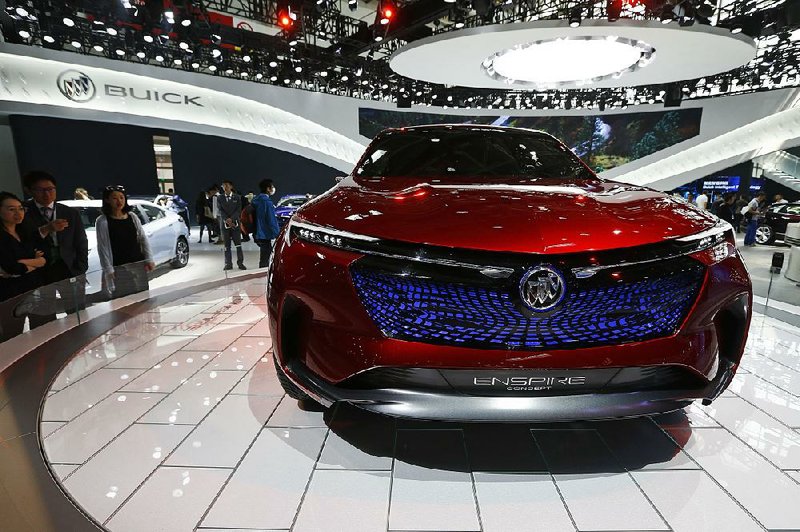President Donald Trump said he is "not really" pleased with the results of U.S. trade talks with China so far as some of his loyalists attacked his retreat from threatened tariffs as a betrayal of his populist campaign promises.
Trump expressed his misgivings on the negotiations to reporters during an Oval Office meeting Tuesday with South Korean President Moon Jae-in. Asked whether he was pleased with the talks, Trump responded, "No, not really," though he added, "They're a start."
The Trump administration decided to hold off on imposing tariffs on billions of dollars' worth of Chinese goods because of White House discord over trade strategy and concern about harming negotiations with North Korea, according to people briefed on the administration's deliberations.
The agreement at least delays a trade war between the world's two largest economies, the prospect of which has rattled financial markets for months. But many U.S. concerns about China's economic practices remain unresolved: its acquisition of American technologies; the country's plans to subsidize the growth of advanced domestic industries such as artificial intelligence and clean energy; and U.S. companies' access to China's markets.
Former Trump adviser Steve Bannon blamed Treasury Secretary Steve Mnuchin.
Trump "changed the dynamic regarding China but in one weekend Secretary Mnuchin has given it away," Bannon said in an interview. "Mnuchin has completely misread the geopolitical, military, and historical precedents, and what President Trump had done was finally put the Chinese on their back heels."
Some White House officials blame poor coordination among the warring factions in Trump's economic team for the retreat, according to several people briefed on the matter. Within the administration, divisions are raw between free-trade supporters such as Mnuchin and White House economic adviser Larry Kudlow and China hawks led by White House trade adviser Peter Navarro.
During a trip to Beijing earlier this month, Navarro and Mnuchin argued about the U.S. negotiating position, and Navarro wasn't deeply involved last week in negotiations with a Chinese delegation in Washington.
The divisions are apparent in Trump's public actions. In April, the Commerce Department cut off Chinese telecommunications company ZTE Corp. from its American suppliers in response to what Commerce Secretary Wilbur Ross called "egregious" violations of U.S. sanctions against doing business in Iran and North Korea.
Trump reversed course via tweet a week ago, declaring that it would cost "too many jobs in China."
Trump said Tuesday that he ordered a review of the penalty as "a favor" to Chinese President Xi Jinping and said the penalties against ZTE also were "really hurting American companies." He added he would "envision" a revised penalty for the company including a requirement that it appoint a new board of directors and a "very large fine" of perhaps $1.3 billion.
Asked about the company, he said there is no deal yet with China -- but it was not clear whether he was speaking specifically about ZTE or about broader trade disputes.
Mnuchin said earlier Tuesday that the U.S. didn't mean to "put ZTE out of business" by penalizing the company for violating U.S. sanctions.
Meanwhile, China's Finance Ministry said Tuesday that it would trim tariffs on imported cars to 15 percent of their wholesale value, from 25 percent. It also cut tariffs on imported car parts, reducing them to a standardized 6 percent. Chinese tariffs on parts currently range from 6 percent to 25 percent, depending on the category, and average about 10 percent. The U.S. auto industry and its workers, however, might be unimpressed.
The moves are intended to address long-standing complaints from the Trump administration and global automakers that China's tariffs on imported cars are much too high. Those tariffs are one reason -- though by no means the only reason -- that global automakers like Ford, General Motors, Toyota and Volkswagen have built enormous factories in China over the past two decades. Those factories, built and run with Chinese joint-venture partners, have helped make China by far the world's largest automaker.
Chinese tariffs will still be relatively high, however, and the change is unlikely to motivate automakers to shift production away from China. The United States has a tariff of 2.5 percent on cars, minivans and sport utility vehicles, for example, although it has a 25 percent tariff on imported pickups. Global automakers also have grown comfortable making cars in China, where sales have boomed.
The drop "is a significant reduction, but it really won't have much of an effect" on where automakers assemble vehicles, said James Chao, the chief Asia auto analyst at IHS Markit.
By cutting the tariff on imported car parts more than on imported cars, China may actually strengthen its role as the world's largest car-assembling nation.
Information for this article was contributed by Justin Sink , Jenny Leonard and Kevin Cirilli of Bloomberg News and by Keith Bradsher of The New York Times.
Business on 05/23/2018
